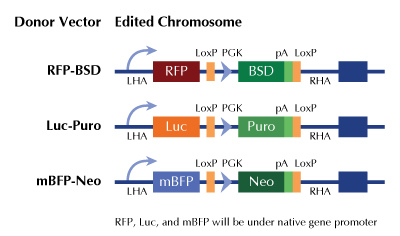Smad3 Mouse Gene Knockout Kit (CRISPR)
CAT#: KN316272RB
Smad3 - mouse gene knockout kit via CRISPR, HDR mediated
Functional Cassette: GFP-puro Luciferase-Puro mBFP-Neo
HDR-mediated knockout kit validation
USD 1,657.00
4 Weeks*
Specifications
| Product Data | |
| Format | 2 gRNA vectors, 1 RFP-BSD donor, 1 scramble control |
| Donor DNA | RFP-BSD |
| Symbol | Smad3 |
| Locus ID | 17127 |
| Components |
KN316272G1, Smad3 gRNA vector 1 in pCas-Guide CRISPR vector KN316272G2, Smad3 gRNA vector 2 in pCas-Guide CRISPR vector KN316272RBD, donor DNA containing left and right homologous arms and RFP-BSD functional cassette. GE100003, scramble sequence in pCas-Guide vector |
| Disclaimer | These products are manufactured and supplied by OriGene under license from ERS. The kit is designed based on the best knowledge of CRISPR technology. The system has been functionally validated for knocking-in the cassette downstream the native promoter. The efficiency of the knock-out varies due to the nature of the biology and the complexity of the experimental process. |
| Reference Data | |
| RefSeq | NM_016769 |
| UniProt ID | Q8BUN5 |
| Synonyms | AU022421; Madh3 |
| Summary | Receptor-regulated SMAD (R-SMAD) that is an intracellular signal transducer and transcriptional modulator activated by TGF-beta (transforming growth factor) and activin type 1 receptor kinases. Binds the TRE element in the promoter region of many genes that are regulated by TGF-beta and, on formation of the SMAD3/SMAD4 complex, activates transcription. Also can form a SMAD3/SMAD4/JUN/FOS complex at the AP-1/SMAD site to regulate TGF-beta-mediated transcription. Has an inhibitory effect on wound healing probably by modulating both growth and migration of primary keratinocytes and by altering the TGF-mediated chemotaxis of monocytes. This effect on wound healing appears to be hormone-sensitive. Regulator of chondrogenesis and osteogenesis and inhibits early healing of bone fractures. Positively regulates PDPK1 kinase activity by stimulating its dissociation from the 14-3-3 protein YWHAQ which acts as a negative regulator (By similarity).[UniProtKB/Swiss-Prot Function] |
Documents
| Product Manuals |
| FAQs |
| SDS |
Resources
Other Versions
| SKU | Description | Size | Price |
|---|---|---|---|
| KN316272 | Smad3 - mouse gene knockout kit via CRISPR, HDR mediated |
USD 1,657.00 |
|
| KN316272BN | Smad3 - mouse gene knockout kit via CRISPR, HDR mediated |
USD 1,657.00 |
|
| KN316272LP | Smad3 - mouse gene knockout kit via CRISPR, HDR mediated |
USD 1,657.00 |
|
| KN516272 | Smad3 - KN2.0, Mouse gene knockout kit via CRISPR, non-homology mediated. |
USD 1,657.00 |
|
| GA202546 | Smad3 CRISPRa kit - CRISPR gene activation of mouse SMAD family member 3 |
USD 1,657.00 |
{0} Product Review(s)
Be the first one to submit a review






























































































































































































































































 Germany
Germany
 Japan
Japan
 United Kingdom
United Kingdom
 China
China
